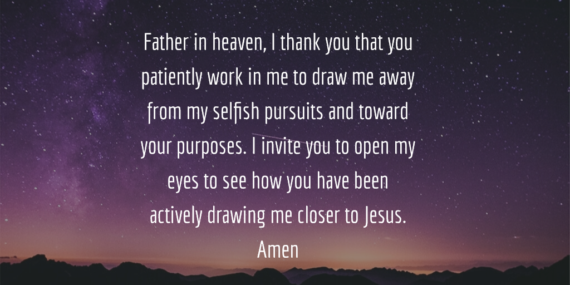Recently I heard a sermon about John the Baptist and his call to repentance as a way to prepare for the coming of King Jesus. The preacher exhorted each of us to consider ways we should repent (i.e. turn around). The church was located in an affluent area, and the congregants reflect the lifestyle of the financially prosperous.
 After the service let out, I was in the parking lot talking to my hosts, when another attendee walked past and engaged in conversation. He said he was soon to drive his motor home to Palm Springs to stay for some weeks, after which he would drive up along the California coast visiting beautiful cities along the way.
After the service let out, I was in the parking lot talking to my hosts, when another attendee walked past and engaged in conversation. He said he was soon to drive his motor home to Palm Springs to stay for some weeks, after which he would drive up along the California coast visiting beautiful cities along the way.
In these instances, we who have spent years in poorer countries or neighborhoods are often challenged with a private, parallel conversation. For me it could be summarized as, “What would one of my simple village pastors from Africa think if he had heard that sermon on repentance, and  now stood in this conversation in the parking lot?” (Note: I include the descriptor “village” because some city pastors and elders in African cities are economically more akin to the American RV owner than their village compatriots.)
now stood in this conversation in the parking lot?” (Note: I include the descriptor “village” because some city pastors and elders in African cities are economically more akin to the American RV owner than their village compatriots.)
I had the same internal conversation on a walk during the recent Christmas season. I passed through a neighborhood of multi-level homes which cost hundreds of thousands to build. In the driveway sat at least one glimmering SUV, and on the lawn a “creche” depicting the humble birth of Jesus. Again, I wondered if a Christian from the developing world would view that scene as a bewildering contradiction.
How does a rich man repent?
I think of the rich young ruler who engaged Jesus with the question of his salvation. Since the man was keeping the Mosaic Law, Jesus finally told him to sell all he had and give to the poor. The young man went away sad because he had many possessions.
Did Jesus want the young entrepreneur to give everything away so as to join the ranks of the poor? I think not. But the Lord saw that the man loved his possessions, which was an impediment to discipleship. Paul wrote along this line when he said that the love of money is the root of all evil. If I love my money, I need to repent. But how do I know when I have stopped stewarding my money righteously and come to love my money? If such love is actually covetousness, idolatry, possessiveness, or a source of pride, then no one knows if I need to repent other than God and me — and I am well able to deceive myself.
I begin to see that the African villager cannot really know how the rich American should repent, any more than the rich American can really know how the African should repent. But I am sure each would receive insight on the matter, to their benefit, if they spent some hours together reading God’s word and praying!
A young Christian family, living in the same metro area as the wealthy RV owner, formerly wanted to buy a larger home. But they intentionally decided to live simply in their current house. Dad takes the shuttle train to work, when he could drive his own car. A rich young family is seeking to live a lifestyle of repentance.
I heard of a Christian church that has decided to rent a central space accessible to all, rather than build their own building in the suburbs; this way they are able to put more funds into mission and outreach to the community. A rich young church seeks an attitude of repentance.
Repentance is a matter of the heart. If I am a hypocrite in my heart, I must deal with the fact that the Holy Spirit lives there too. A man with less money can actually love his money more, even as a man with more money can love it less. Are both of them ready to give their money away freely, as managers of God’s resources?
Repentance is a matter of my time, place, and circumstance. Another person cannot know my context, and therefore cannot rightly judge what I should do. But neither should I judge what another man does, or does not do. Maybe that is why community is so important, for people who share the same context can observe and speak forthrightly into each others lives.
“If my people who are called by My name will humble themselves, and pray and seek My face, and turn from their wicked ways, then I will hear from heaven, and will forgive their sin and heal their land” (2 Chron. 7:14, NKJV).
Photos:Â WP ImageSmart/Pixabay
Save
Save
Save
Save
HTML Forms powered by
Wufoo.
Save
Save
Save
Save
Save
Save
Save
Save
Save




